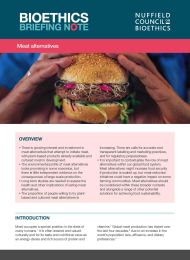Meat alternatives
Policy Briefing
Published 08/01/2020

Public health considerations
The long-term health effects of consuming meat alternatives have not been established and it is not yet known how people will incorporate these foods into their diets. These products are usually highly processed and the use of novel ingredients and new production processes might carry health risks that are hard to predict. Terms used by manufacturers to describe meat alternatives that promote their environmental and animal welfare benefits, such as ‘clean’, ‘green’ and ‘slaughter-free’, might mean people overlook the health implications of these products. However, there are questions around whether it is appropriate or fair to hold meat alternatives to higher standards of healthiness than conventional meat, given their potential positive environmental and animal welfare profiles, and how moral trade-offs of this kind could be addressed.
Reports suggest that people are not buying meat alternatives to entirely replace animal products. There is the possibility that the availability of meat alternatives might increase people’s overall consumption of meat and meat-like products, which could have health implications. It is unclear how this outcome would be managed or controlled to prevent an exacerbation of the challenges of meat production and consumption.
Marketing and labelling
There are ongoing disagreements over the use of the term meat, and terms associated with meat, in labelling for non-meat products. There are questions about whether meat alternatives can be sold alongside meat in shops, and whether cultured meat products should be labelled according to their method of production. These questions reflect ambiguities which may be inevitable as part of a process of the changing meanings of meat.
There have been calls to ensure that labelling and marketing is accurate and transparent so that people are not misled or confused. People might have concerns about the ingredients used during manufacture and the presence or use of genetically modified organisms. A Chatham House report calls for further research to explore public attitudes on meat alternatives and how they ought to be labelled.
The place of meat alternatives in sustainable food systems
Taking a holistic food systems approach to addressing the challenges of meat production and consumption involves consideration of health, social, economic, political, animal welfare and environmental domains. Food systems are global and highly complex, and interact with a range of ethical issues such as climate change, food justice, and fair distribution of resources within local and country-specific contexts.
Technologically driven food reform promises a range of benefits, though solutions ought to be implemented with due consideration to those whose livelihoods and homes could be impacted. One billion people, mostly from low-income countries, depend on livestock for their livelihoods, and are likely to be affected by meat reduction policies and the development of meat alternatives in high-income countries. There are food justice concerns about meat alternatives being part of a corporate food agenda with small number of multinational food companies having a monopoly over meat production, which could reinforce the gap between poorer and richer nations and decrease local self-sufficiency.
Currently, meat alternatives are relatively expensive food items. In the future, however, they could offer greater food security if production is scaled up and they become cheaper than conventional meat. However, some would argue that promoting cheaper, healthier plant-based diets should be the focus.
The development of meat alternatives is a technological approach to reducing the adverse effects of meat production and consumption. Other approaches, which must not be overlooked, include improving global livestock practices, educational interventions and enacting behavioural change to reduce food waste and meat consumption, increasing the nutritional value of food, increasing the consumption of minimally processed plant-based proteins, and solutions addressing fair distribution of food resources for people across the world.*
*Kim B et al. (2015) The importance of reducing animal product consumption and wasted food in mitigating catastrophic climate change; John Hopkins Center for a Liveable Future; The EAT-Lancet report suggests diets with smaller portions of meat and minimally processed foods to improve human health and the environment; A report by the RSA Food, Farming and Countryside Commission proposes ‘regenerative agriculture’ for more sustainable meat consumption; The Food Ethics Council advises caution in viewing meat alternatives as a ‘silver bullet’ for the world’s food security problems.

Share